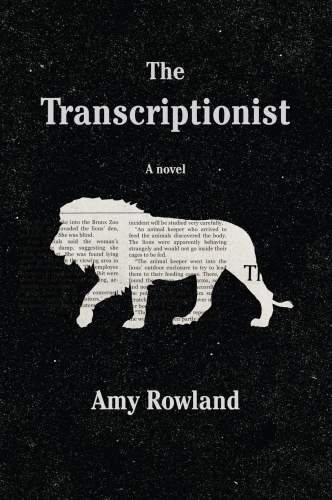
The Transcriptionist
A Novel
کتاب های مرتبط
- اطلاعات
- نقد و بررسی
- دیدگاه کاربران
نقد و بررسی

February 10, 2014
New York Times veteran Rowland treads familiar ground (familiar to her, at least) in her debut novel, set primarily amid the remote offices of Record, a fictional newspaper. Lena is the newspaper’s sole remaining transcriptionist, her job having been made nearly redundant by technology. Lonely and prone to melancholy, she is haunted both by the words that are edited out of her transcribed stories prior to publication, and by her childhood fear of mountain lions. Both preoccupations come to a head after a blind woman, with whom Lena had a brief encounter, is found mauled to death in the Bronx Zoo’s lion exhibit. Lena’s identification with the dead woman verges on obsession as she researches the woman’s life and death. Rowland’s farcical approach (for example, Lena finds mental safety in periodically donning the biohazard escape hood that she was given by the newspaper) is balanced by the novel’s realistic insights into journalistic integrity, the evolution of contemporary newspaper publishing, and, more broadly, the importance of genuine communication. “Listening,” notes Lena, “helps us recognize our absurdity, our humanity.”

February 15, 2014
A blind woman's suicide prompts a newspaper staffer to rethink journalism in particular--and the nature of existence in general. Rowland's debut novel centers on Lena, an employee at major New York daily the Record, where she transcribes interview tapes and takes reporting calls from foreign correspondents. It's a dying job in a dying industry, and Rowland emphasizes the strangeness of the gig and Lena's own isolation within it. (Conspicuous references to Beckett, O'Connor and Calvino bolster the out-of-the-mainstream mood.) A story about a woman who broke into the lions' den at the Bronx Zoo and was promptly killed sparks Lena's sorrow and curiosity (they had a brief encounter), and the novel turns on her effort to learn more about the woman's life than simple journalism will deliver. Rowland deliberately presents the profession in a fun-house mirror: Staffers are given emergency "escape hoods" instead of bonuses thanks to post-9/11 anxiety; an aging staffer spends days musing over the obituary archives; and the publisher's pronouncements are pompous even by CEO standards. In stuffing this milieu with bits of mystery, romance and aphoristic riffs on listening and silence, Rowland has taken on a bit too much; the novel's tone unsteadily shifts from the bluntly realistic to the fuzzily philosophical. Even so, individual scenes and characters are very well-turned: Lena's visit to a potter's field where the mauled woman is buried, a conversation with the security guard at the lions' den, the preening investigative reporter who makes a major error about weapons of mass destruction in Iraq. Rowland has a talent for making the real world just a touch more Day-Glo and off center, but Lena's own concerns about listening and being get short shrift in the process. An appealing attempt to wed the weird and everyday in a newsroom setting--it's a cousin to Renata Adler's Speedboat (1976)--that never quite finds solid footing.
COPYRIGHT(2014) Kirkus Reviews, ALL RIGHTS RESERVED.

February 1, 2014
Tucked away in an almost forgotten corner of a large office building, young Lena Respass toils away at a virtually obsolete profession for a legendary New York City-based newspaper, the Record. She's a transcriptionist, typing out news stories reported to her verbally from around the world. This ambitious and fascinating debut novel is perhaps most essentially about the kind of work Lena does--listening. The story is set in motion by Lena's chance encounter with a mysterious blind woman, who warns her, "Be careful what you listen to. Be careful what you hear." Single, terribly alone in New York, and plagued by paralyzing doubts about the meaning of her life and work, Lena has come to regard what the paper defines as news as dangerous and deeply misguided--mindless and fawning celebrity profiles alongside stories of misfortune, war, and death. Her belief is substantiated when she looks into the story of a lion mauling reported in the paper. By the end, Rowland will have some very unflattering things to say about the state of modern journalism, especially its increasingly cozy and collaborationist relationship with government. VERDICT Disturbing and powerful; the skillfully drawn Lena may remind some readers of an existentialist hero. Recommended for fans of literary fiction. [See Prepub Alert, 11/22/13.]--Patrick Sullivan, Manchester Community Coll., CT
Copyright 2014 Library Journal, LLC Used with permission.

























دیدگاه کاربران